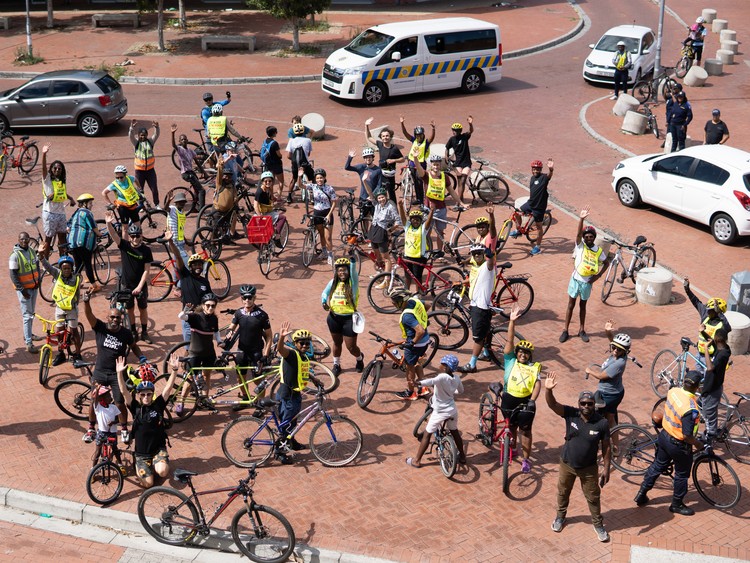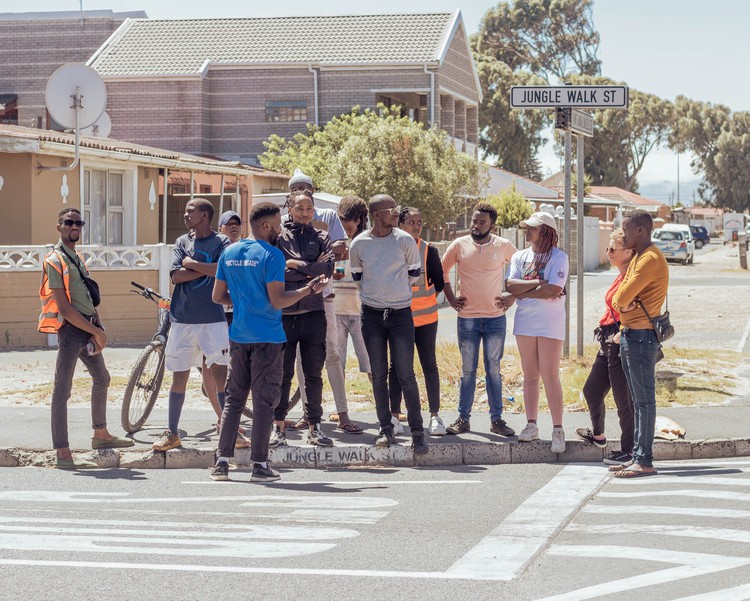Is cycling the way to improve mobility in Langa?
The Langa Bicycle Hub and Human Sciences Research Council will host a walk through the township on 7 March
The Langa Bicycle Hub and Human Sciences Research Council to host walk through the township on 7 March. Photos: supplied
As Langa commemorates its 100th year in 2023, we see efforts to increase cycling in Langa as part of a bigger plan to help residents move around more easily and safely in decades to come.
Langa was established in 1923 and is South Africa’s oldest township. In a recent “walk and talk” event, supported by the Human Science Research Council (HSRC), a group of residents discussed the elements already present in Langa on which more can be built. Langa has potential for change, despite the destructive apartheid design which resulted in only one way into the township, isolating it from the rest of the city. Knowledge, local activism and collaborations hold the key.
As a relatively small yet overpopulated township, Langa has a train station which we hope will one day be functional again. Langa also has residents and organisations eager to find ways of collectively improving how people move around.
During lockdown in 2020, the Langa Bicycle Hub was established as a place where people could learn to cycle and fix their bicycles. It has slowly evolved and is now located at the City of Cape Town’s Sports Complex.
During that period, bicycles were used to transport food and medicine to bed-ridden residents. Over time, this has become an informal job creation tool. There are several bicycle delivery companies as well as people doing it on their own. More and more, there are adults who have lost their jobs and have picked up a bicycle and stand outside supermarkets and connect with informal traders to do deliveries.
Organisations like the Bicycle Empowerment Network (BEN Bikes) and others have supported efforts to promote cycling in the township.
In an ideal world, there should be a network of cycle lanes, but that might not be possible given the narrow roads in Langa.
People are not only cycling within Langa. Some residents have been cycling for many years to their places of work across Cape Town, cycling more than 35km daily and often having to use the N2 and the bridge that connects Langa and Pinelands. They face the risk of being mugged, hit by a car or fined, because cycling is not allowed on the highway.
There is also room for improvement with pedestrian infrastructure, though there is some good infrastructure along King Langalibalele Road with the increase of economic activity in the space which includes tourism, retailers and small businesses.
The group walked along Jungle Walk in Langa and discussed mobility challenges in the area.
During our “walk and talk” event we stopped at a pedestrian crossing. Some people there acknowledged they did not know how the crossings are meant to work. To make the point, one tried to cross along the white lines only to find that no car would stop. Eventually, a police vehicle stopped and allowed him to cross.
There is a need to assist school children, not just to cross major roads, but also when walking to school. The “walking bus” has been successful in Mitchells Plain and other parts of Cape Town with adults, often Neighbourhood Watch members, accompanying children to and from school to ensure their safety.
With the help of a forum, people can come together to improve public spaces and transport in Langa. With the support of the HSRC and others, the plan is to launch a public space and mobility platform which links to the active mobility forum created for Cape Town in 2022.
The next walk through Langa, which will include government officials, will take place on 7 March.
Mzikhona Mgedle is from Langa Bicycle Hub and Diana Sanchez Betancourt is a Senior Researcher at the Human Sciences Research Council. Views expressed are not necessarily those of GroundUp.
Next: After widespread looting in Delmas, immigrant shopkeepers struggle to open
Previous: Court orders former Lottery boss to pay punitive legal costs to journalist
© 2023 GroundUp. This article is licensed under a Creative Commons Attribution-NoDerivatives 4.0 International License.
You may republish this article, so long as you credit the authors and GroundUp, and do not change the text. Please include a link back to the original article.
We put an invisible pixel in the article so that we can count traffic to republishers. All analytics tools are solely on our servers. We do not give our logs to any third party. Logs are deleted after two weeks. We do not use any IP address identifying information except to count regional traffic. We are solely interested in counting hits, not tracking users. If you republish, please do not delete the invisible pixel.




